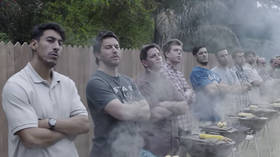Inspiring men's best or presuming their guilt? RT debate on Gillette's 'toxic masculinity' ad
A new ad by razor company Gillette has sparked massive backlash – some saying it presents stereotypes about men that suggest they are evil by nature, while others claim it shows them how to change for the best.
“What’s wrong with highlighting the best version of you? What’s wrong with inspiring men to be the best men they can be?” asked Joanna Baban Morales, marketing specialist and founder of fashion brand Nunude. Her argument refers to the tagline from the ad, “The best men can be,” a slogan which is supposed to encourage men to overcome toxic behaviors such as sexual harassment, bullying and ‘man-splaining.’
Steve Malzberg, a TV host and political commentator, countered that the ad “shows the masses of men as evil.” The only “good men” depicted are those who overcame their “evil masculinity,” which gives them the right to act as a kind of social-justice police-force for the others, he suggested. He also took issue with Gillette electing themselves to be the ones who provide this “lecture” to all men.
“By the way, boys will be boys. There is nothing wrong with young boys getting into scuffles,” Malzberg continued, responding to the commercial's criticism of a phrase which some believe serves as an excuse for masculine violence and aggression.
“Of course boys will be boys, but what does that mean? Are we allowing boys to always have fights in the streets? Are we condoning it?” Morales chimed in, asking if we would say the same regarding rampant knife-crime in the UK. “It’s ok to not be aggressive, it doesn’t affect your masculinity,” she went on, adding that those whose masculinity is threatened by a commercial should rethink what that word means.
Also on rt.com Piers Morgan boycotts Gillette for waging ‘war against masculinity’ with ‘man-hating’ adSocial media backlash was swift after the video was published on YouTube on Sunday, generating tens of thousands of ‘dislikes’ and hot debate. The polarized reaction to the ad highlights a broader debate about gender relations which has exploded since the #MeToo movement hit the mainstream.
Think your friends would be interested? Share this story!














